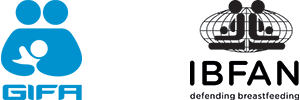
As recent scientific studies have shown, breastfeeding is a crucial element for the survival, health and development of infants and young children. Several instruments for the protection of breastfeeding have been developed at international level
2024/02/05
International recommandation
The World Health Organization (WHO) and UNICEF recommend, since 2002, exclusive breastfeeding for up to 6 months and then continued breastfeeding for up to 2 years or more along with complementary feeding.
There is evidence that the practice of breastfeeding as recommended significantly reduces infant mortality, while the total or partial failure to breastfeed leads to increased health risks (perinatal infections, diarrhoea and pneumonia, the most deadly childhood diseases). Also, breastfeeding reduces the risk of overweight and obesity while favouring a higher IQ (2013) and Lancet 2016. Breastfeeding also provides maternal health benefits, including reducing the risk of gynaecological cancers and postpartum stressors. See also NCD and Immunology.
Protecting Breastfeeding: The International Code
Recognizing the crucial importance of breastfeeding for child development, maternal health and the social and economic sustainability of families and nations, the international community adopted the International Code of Marketing of Breast-milk Substitutes in 1981, which provides a strict regulatory framework for commercial practices to protect breastfeeding. In 1990, in order to better protect, encourage and support breastfeeding, the international community adopted the Innocenti Declaration on Infant and Young Child Feeding, renewed and expanded 15 years later, in 2005.
Innocenti Declaration
In 1991, in the wake of the Innocenti Declaration 1990, WHO and UNICEF jointly launched the Baby-Friendly Hospital Initiative (BFHI) to ensure that the principles defined at Innocenti are respected in hospitals. Subsequently, the Innocenti Declaration and the Baby-Friendly Hospital Initiative served as the basis for the development of the Global Strategy for Infant and Young Child Feeding (IYCF) adopted in 2002 by the World Health Assembly (WHA) to strengthen efforts to promote, encourage and support best practices in infant feeding and in particular breastfeeding.
The Global Strategy defines not only the obligations of States in this regard, but also those of international organizations, NGOs and other stakeholders, including commercial actors. The latter are required to comply directly with the provisions of the International Code, regardless of their implementation through national laws.
This obligation is reiterated in General Comment No.15 issued in 2013 by the Committee on the Rights of the Child, which states that “Among other responsibilities and in all contexts, private companies should: […] comply with the International Code of Marketing of Breastmilk Substitutes and the relevant subsequent World Health Assembly resolutions […].” Despite these provisions, companies producing breastmilk substitutes do not meet their obligations and systematically violate the provisions of the International Code.
In 2014, the two final documents of the Second International Conference on Nutrition (Rome Declaration on Nutrition and Framework for Action) also recognize the importance of breastfeeding and recommend the necessary actions to be taken.
For more information, read the document Acknowledgment of Breastfeeding (in French) prepared by Maryse Arendt (IBFAN Luxembourg), which presents extracts from the Rome Declaration and the recommendations of the Framework for Action on Breastfeeding.
